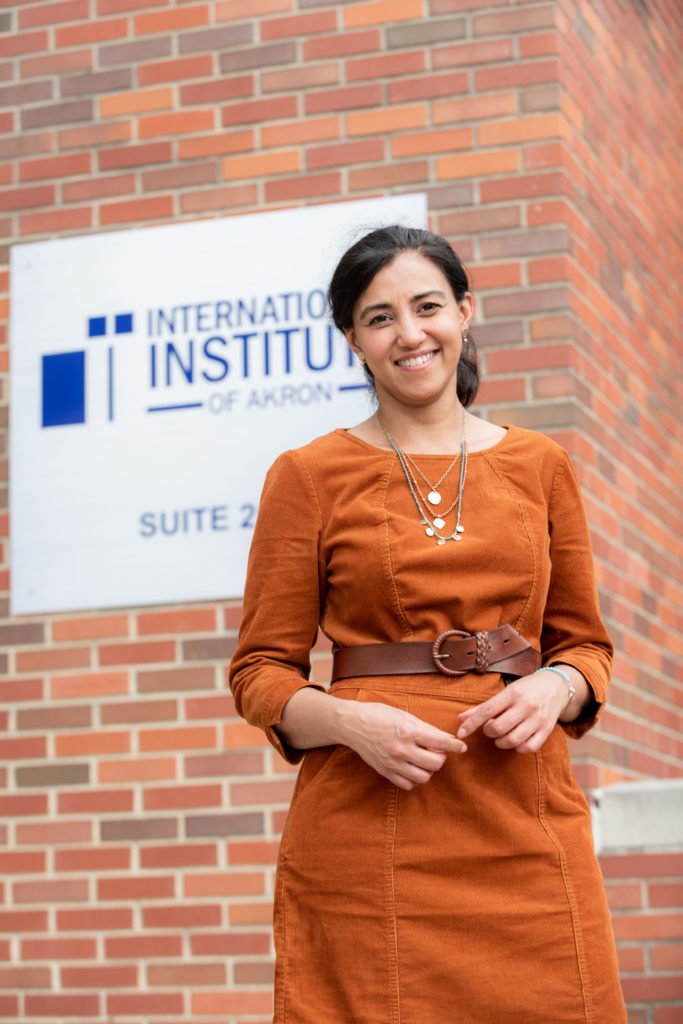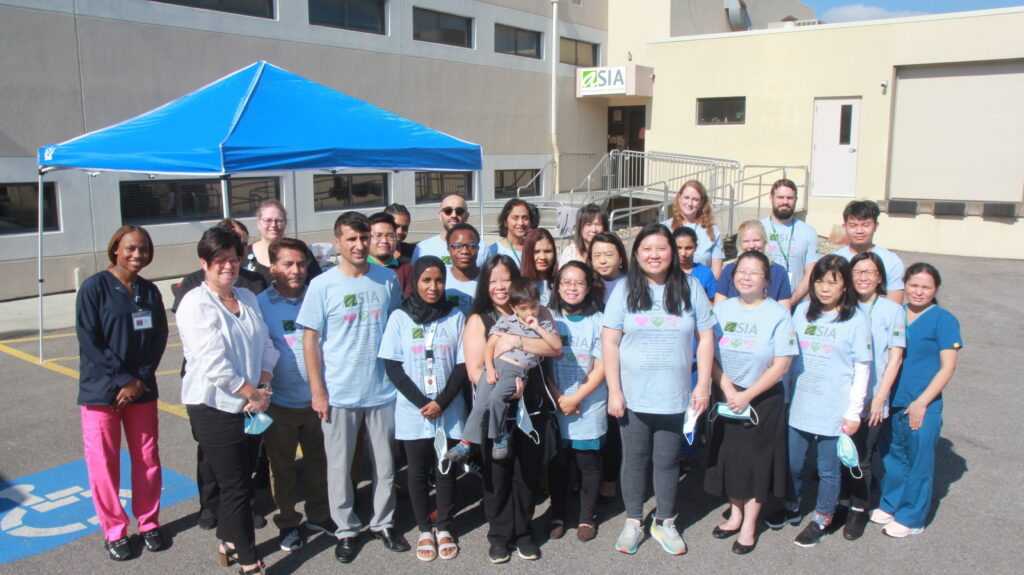Creating a Welcoming New Home
Local nonprofits help resettled residents through partnerships, philanthropy

When the United States pulled out of a 20-year occupation of Afghanistan this summer, it triggered a humanitarian crisis that displaced more than 550,000 Afghans, nearly 1,000 of whom will resettle in Ohio. Around 200 Afghan refugees are expected to arrive in Akron.
While there is often a misperception that resettled immigrants and refugees are showered with government assistance, the truth is that debt – along with strict pending deadlines – accrues as soon as the plane lands.
"When someone gets off the airplane, they have 90 days to get settled in a completely new country and under completely new circumstances, from housing to finding a job," said Elaine Tso, chief executive officer of Asian Services In Action (ASIA) Inc. "They have such a tiny amount of time."
"The federal resettlement program does provide direct assistance to refugees, but when they arrive, they already have a debt to the U.S. government to pay back their cost of the flight," said Madhu Sharma, executive director and director of immigration legal services for the International Institute of Akron (IIA), a resettlement agency in Akron's North Hill neighborhood that has been in operation for more than 100 years.
"The direct assistance they receive is nominal, and it's supposed to last 90 days" to cover basic necessities, Sharma said, adding that the need for these types of services for refugees and immigrants can easily extend to five years or more. "Usually, IIA helps them secure employment, but we have to teach them basic life skills and language skills. It's a difficult beginning in the United States, but we're here to soften that."
Sharma adds that the International Institute offers a robust immigration and legal services department, perhaps the most robust of any resettlement agency in Ohio.
"This is a population that is the most courageous because they are stepping out of everything that is known to them," said Koula Glaros-King, staff attorney at Community Legal Aid and the nonprofit's only full-time immigration attorney. "The courage to leave for them is extraordinary. Every immigrant brings their own survivor skill set."
While ASIA Inc. does not directly provide help with resettlement, its range of services is crucial to immigrants and refugees. But little for refugees comes free. "It's not like they get a blank check," said Tso.
ASIA Inc. does provide refugee health screenings to brand new arrivals, Tso said, but she points out that these services benefit the health of the community, too. "We are one of the community health centers that provides (refugees) with vaccines, a general exam for a clean bill of health, and making sure they have a medical home. We also help them find a longer-term solution for employment needs," Tso added, along with emergency food services and citizenship classes.
And the agency's language classes go beyond just teaching words and phrases: Hygiene, etiquette, cultural knowledge, and civic assistance are also focal points of the programming.

Obstacles and Challenges
Once basic needs are met for people resettling in Northeast Ohio, the challenges continue in other areas, such as navigating the health care and legal systems and gaining sustained employment.
In Tso's estimation, the top challenges are "learning a language, being able to get from place to place, and navigating public transportation." And equally important is the cultural adjustment.
"When people resettle, sometimes they're coming from war-torn countries or communities where police and military are not comfortable faces to see," she said. "Sometimes community members are less comfortable around police and even have an unwillingness to call the police in the event of a crime."
But, she says, developments like the Akron and Cuyahoga Falls police departments hiring their first Bhutanese police officers will hopefully sway this perspective in a more positive direction.
"Not speaking the language itself creates an economic barrier," said Sharma, who adds that IIA addresses this obstacle and others through its case management services, in addition to teaching job and life skills. "The barriers are the same that many Americans face, but then you add to that the lack of cultural knowledge, lack of cultural access, lack of cultural empowerment, and systemic and community racial barriers that exist. But refugees have already been through so much; they're resilient and they will overcome."
Sharma said the goal is for those who resettle to embrace American culture, while also retaining their personal and cultural identity. "But that takes so much time – much longer than the 90 days the government provides for case management," she said.
Health disparities in the refugee and immigrant communities continue to be a pervasive issue, especially in the areas of addiction and mental health.
"A lot of (refugees) have complicated, traumatic histories," said Tso. "The kind of behavioral health we provide is not only culturally sensitive, but it's trauma informed."
Although there is a stigma around mental health in the U.S., it's significantly greater in resettled communities, Tso said, adding that mental health is so stigmatized in some of the communities they serve that there isn't even a word for behavioral health.
One specific challenge for people arriving from Afghanistan is that they are resettling under a system the federal government is still piecing together. Deep cuts to the resettlement program in recent years have placed pressure on an already strained system.
"The federal government has not set up a pathway to U.S. citizenship for people coming here from Afghanistan," said Sharma. "They're still stuck in a legal limbo in this country, and that's dangerous."
According to an NPR report, around 53,000 Afghans are living in U.S. military bases – with 14,000 more soon to arrive – as they await basic services like housing, as well as collaboration from agencies like IIA.
And unlike previous resettlement programs, in which Northeast Ohio was the second wave after people lived in refugee camps for years, this area will now be the first stop for people resettling from Afghanistan.
"I think it's going to take more time, and we're going to learn about the barriers," said Sharma.
Role of Partnerships
Summit County's many nonprofits that serve the international community must often rely on one another to make sure clients' needs are fully met. These partnerships emerge from necessity or, in other instances, when one agency steps in to help because funding may be restricted for another.
"Sometimes the projects are specific and have specific funding," said Glaros-King. "In the past, we have been part of naturalization funding that is available. We have partnered on domestic violence cases, as well. We've done presentations to the communities that those organizations serve – everything from identity theft to housing protections to IRS frauds. These are issues that have popped up in the communities."
While partners like Akron Public Schools and local government agencies are crucial to the International Institute's success, Sharma says that community organizations formed by fellow refugees and immigrants are especially valuable. These groups provide a friendly face for those who have recently arrived in the area. "It's someone from home in Akron who's greeting them," Sharma said. "More than any community partners, it is the ethnic community organizations that start to develop from waves of refugees that we partner with closely."
This includes organizations like the Bhutanese Community Association of Akron, Congolese Community Association, Karen Community of Akron and Proyecto RAICES, among a number of other associations. The Islamic Society of Akron and Kent is another community-led organization that will be pivotal for resettling Afghan refugees, Sharma said.
Role of Philanthropy
While the federal government provides some services for the initial resettlement of refugees and immigrants, many agencies must rely on donations, grants and other forms of assistance for long-term supportive services.
"(Philanthropy) makes us able to be inclusive," Sharma said. "We would not have sustained for 106 years if we were restricted in serving the way the state and U.S. government asked us to serve."
"Philanthropy can certainly be a place where there's an investment in the newly arrived community," said Tso. "Immigrants and refugees bring economic vibrancy to a community if philanthropy has the opportunity to invest. For example, we have a microloan program to help immigrants and refugees with startup businesses. That's a huge boon to the community. They typically don't have the long-term credit history to get loans from the bank. Through microenterprises, we're able to give them a small loan and make sure they can repay the loan while establishing their business."
Many new residents also lack the financial resources needed for immigration filing fees, said Glaros-King. She adds that while some of the filing fees are waivable based on income of the applicant and their financial status, a lot of them are not, especially counselor fees.
If someone wants to apply for the immigration of an immediate family member, it can cost them thousands of dollars per person. And sometimes these fees are the only thing standing in the way of people trying to attain legal status. "I've had a lot of people put off replacing documents because of financial limitations," Glaros-King said.
Another pressing issue for this population is translation services. Translating paperwork often requires resources local nonprofits don't have.
"A lot of clients who are eligible to take the (naturalization) test in their own language don't have materials in their own language to study," Glaros-King said.
Immigrants and refugees also encounter costly medical expenses and barriers to transportation. Glaros-King said she's heard of people paying someone as much as $100 to drive them to Cleveland for a simple appointment.
"They pay that money to get to a medical appointment. They also pay them to help fill out forms, but that person is often not authorized to do that," she said. "They might have a notary seal, but they don't have a legal education in the U.S."
She added that people only have one immigration file, "and if there's a mistake, they have to live with them forever. The consequences can be devastating."
As the agencies who participated in this article attest, there is an immense need for resources to help resettled residents in Greater Akron. If you would like to volunteer or make a direct donation, Akron Community Foundation can help connect you to the causes you care about most. Contact John Garofalo, vice president of community investment, at 330-436-5624 or jgarofalo@akroncf.org for more information.
